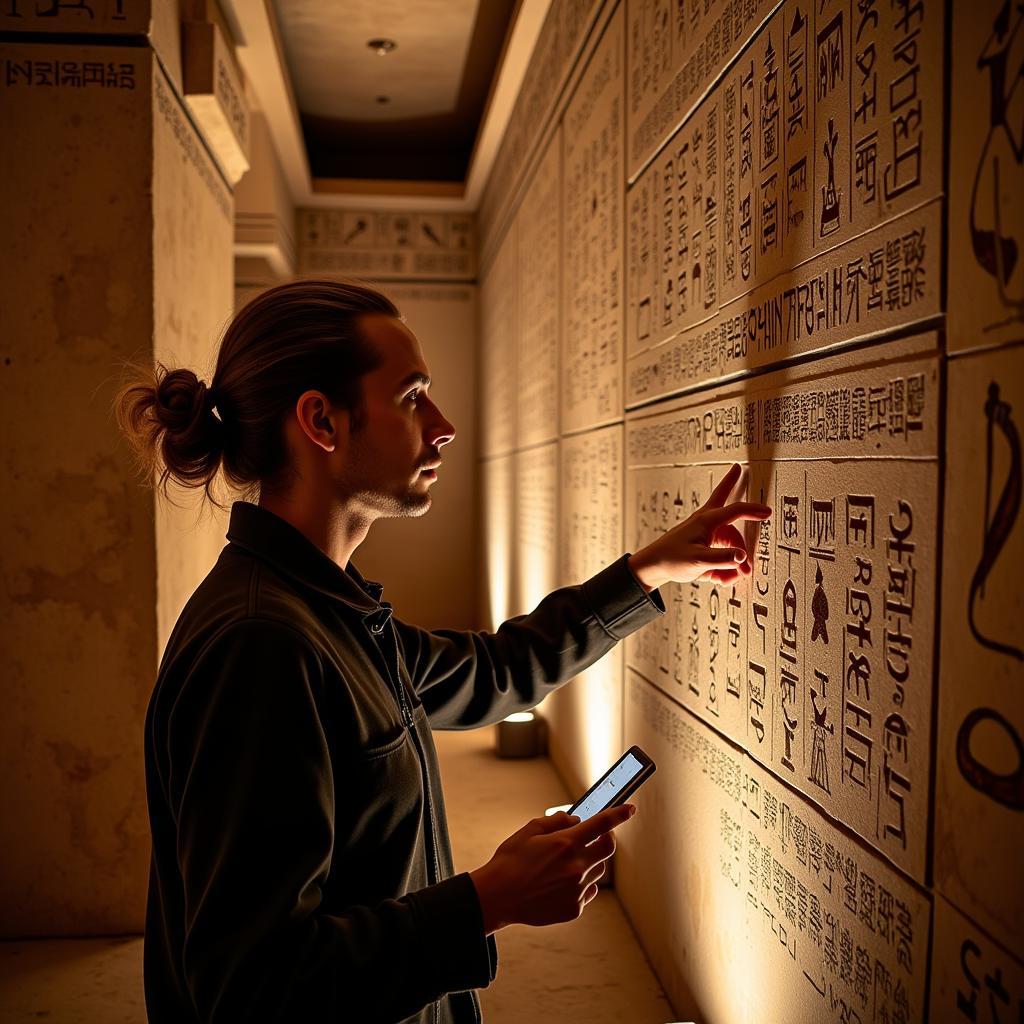Historic Researchers are dedicated individuals who meticulously uncover and analyze evidence from the past to paint a clearer picture of bygone eras. They play a crucial role in piecing together historical narratives, challenging existing interpretations, and enriching our understanding of the forces that have shaped our world. Their work can take them to dusty archives, ancient ruins, or bustling libraries, always in pursuit of knowledge hidden within the annals of time.
Who is a Historic Researcher?
Unlike Indiana Jones, a historic researcher isn’t always on a quest for mythical artifacts. Their work is grounded in meticulous research, critical analysis, and a passion for historical accuracy. They might specialize in a specific period, geographical region, or thematic area, such as ancient civilizations, medieval Europe, or the history of science.
 A researcher carefully examines hieroglyphs on an ancient Egyptian tomb
A researcher carefully examines hieroglyphs on an ancient Egyptian tomb
A historic researcher’s responsibilities can include:
- Formulating research questions: What mysteries of the past do they seek to unravel?
- Identifying and analyzing primary sources: This could involve deciphering ancient manuscripts, scrutinizing historical documents, or examining artifacts.
- Conducting archival research: Spending countless hours in libraries and archives, painstakingly poring over records.
- Interpreting data and drawing conclusions: Like detectives, they piece together fragments of information to form a cohesive narrative.
- Publishing research findings: Sharing their discoveries with the world through scholarly articles, books, or presentations.
The Importance of Historic Research
Why is it crucial to delve into the past? Historic research offers more than just fascinating stories. It provides invaluable insights into:
- Cultural evolution: Understanding how societies developed their customs, beliefs, and traditions.
- Political landscapes: Analyzing power structures, conflicts, and governance throughout history.
- Social change: Tracing the evolution of social norms, values, and interactions over time.
- Economic development: Examining historical patterns of trade, innovation, and economic growth.
- Technological advancements: Recognizing the trajectory of human ingenuity and its impact on society.
By studying the past, we gain a deeper understanding of the present and future. Historic research helps us learn from past mistakes, appreciate cultural diversity, and make more informed decisions about the challenges we face today.
The Evolving Field of Historical Research
The digital age has brought about significant changes in how historic research is conducted. Researchers now have access to:
- Digital archives and online databases: Expanding the accessibility of primary source materials.
- Data analysis tools: Enabling the processing of large datasets and uncovering hidden patterns.
- Virtual reality and 3D modeling: Providing immersive experiences of historical sites and artifacts.
These advancements are transforming the field, allowing for greater collaboration, more comprehensive analyses, and a wider dissemination of historical knowledge.
Becoming a Historic Researcher
If you have a passion for history and a meticulous eye for detail, a career as a historic researcher might be the perfect fit. Aspiring researchers often pursue:
- Bachelor’s and master’s degrees in history: Building a strong foundation in historical methodology and research skills.
- Specialization through doctoral programs: Focusing on a specific area of historical inquiry.
- Internships at museums, archives, or historical societies: Gaining practical experience in research and analysis.
While the work can be demanding, the rewards are immense. Historic researchers have the privilege of uncovering the secrets of the past, contributing to our collective understanding of humanity, and shaping the way we view the world around us.
Conclusion
Historic researchers are the guardians of our collective memory. Their dedication to uncovering and interpreting the past ensures that we learn from the triumphs and tragedies of those who came before us. As we face the challenges of the 21st century, their work remains as vital as ever, reminding us of the enduring power of history to shape our present and future.
Don’t forget to check out our other articles on exciting topics like how much do researchers get paid, researcher job description, and investigative researcher. You can also find fascinating stories about brave researchers wow and learn more about the latest discoveries according to researchers.